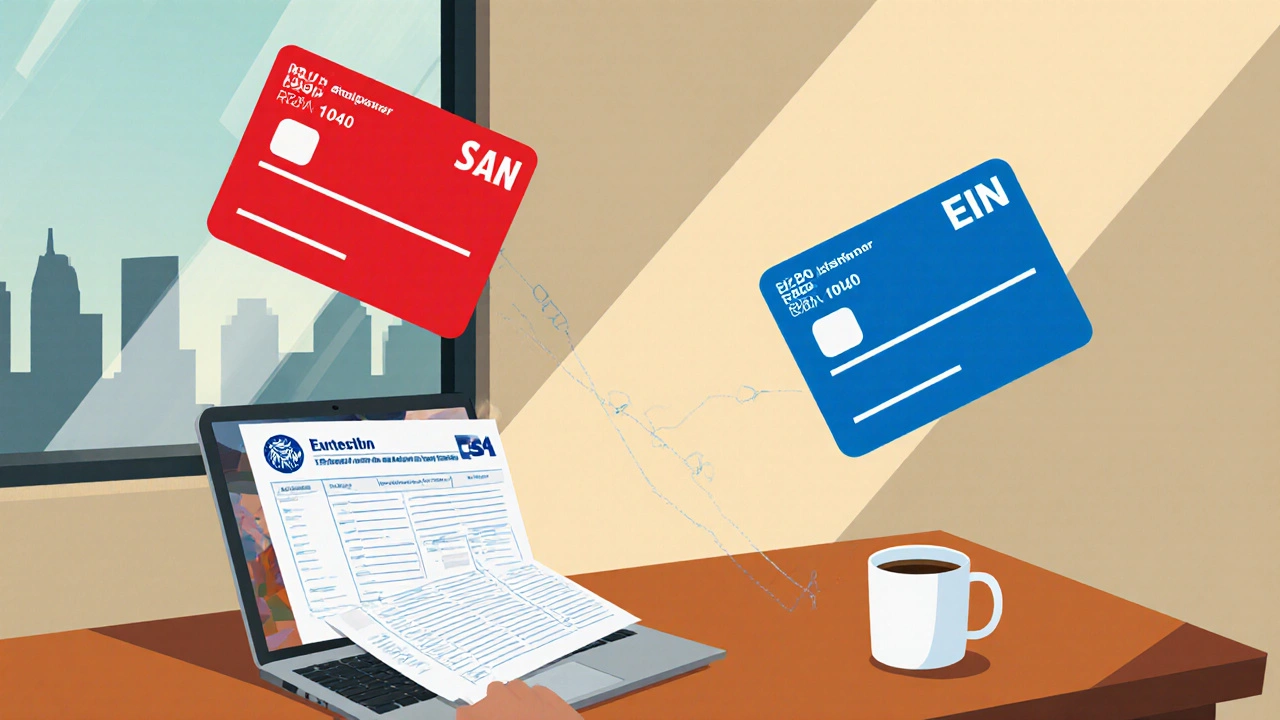When you hear the term EIN is the Employer Identification Number that the Internal Revenue Service (IRS) assigns to businesses for tax reporting, you assume it’s a must‑have for any company. But is it truly required for every operation, or can you actually run a business without one? Let’s break down the real rules, the workarounds, and the risks so you can decide what makes sense for your venture.
Key Takeaways
- Most formal business structures (LLC, corporation, partnership) need an EIN for tax filing and banking.
- Sole proprietors can often use their Social Security Number (SSN) instead, but a bank may still ask for an EIN.
- State‑issued tax IDs or a “doing‑business‑as” (DBA) name don’t replace the federal EIN.
- Operating without an EIN when it’s required can trigger penalties, denied refunds, or bank account closures.
- Applying for an EIN is free, quick, and can be done online in minutes.
When an EIN Is Actually Mandatory
Before you consider skipping the EIN, know the scenarios where the IRS won’t accept anything else:
- Any business that has employees - the IRS needs a number to report payroll taxes.
- Corporations (C‑Corp or S‑Corp) and limited liability companies that elect to be taxed as corporations.
- Partnerships - even a two‑person partnership must file Form 1065 using an EIN.
- Businesses that file any excise, employment, or alcohol, tobacco, or firearms tax returns.
- Entities that need to open a business bank account - most banks require an EIN as proof of legitimate tax identity.
If any of these apply, you’re not really optional; you must obtain an EIN. The good news is the process is painless.
Who Can Operate Without an EIN?
That leaves the classic sole‑proprietor who runs the show alone and doesn’t have employees. In that case, the IRS lets you use your personal SSN for tax filings, like Schedule C attached to your personal 1040. However, there are caveats:
- Some banks still insist on an EIN, even for a simple checking account.
- If you ever decide to hire a part‑time helper, you’ll need an EIN immediately.
- State licensing agencies might ask for a federal tax ID when you apply for a business license.
So while it’s legally possible to fly solo with just an SSN, practical obstacles often push you toward getting an EIN anyway.

Alternatives and Work‑arounds
People sometimes wonder if a state tax ID or a DBA registration can stand in for the federal number. The short answer: no, they’re separate identifiers.
For example, California’s State Tax ID is used for state sales tax and employment tax purposes, but the IRS still requires a federal EIN for federal tax returns. The same goes for a DBA - it simply lets you trade under a name other than your legal name, but it offers no tax‑ID functionality.
If you truly need an identifier for state tax filings but want to avoid the federal EIN, you can apply for a state‑level ID. Yet, if your business later expands or hires, you’ll end up with both anyway.
Step‑by‑Step: Getting an EIN (Even If You Think You Don’t Need One)
- Gather basic information: legal name, address, type of entity, and reason for applying.
- Visit the IRS EIN Online Application. The portal is available Monday-Friday, 7 a.m. to 10 p.m. Eastern.
- Complete the form by selecting your entity type (e.g., Sole Proprietor, LLC, Corporation).
- Submit. You’ll receive your EIN instantly as a PDF document.
- Record the EIN safely. You’ll need it for tax returns, payroll, and bank account setup.
The whole process usually takes less than ten minutes and costs nothing. No third‑party fees are required - the IRS warns against paying for “fast EIN services.”
Comparison: Entity Types and EIN Requirements
| Business Structure | Typical EIN Need | Can Use SSN? | Bank Account Requirement |
|---|---|---|---|
| Sole Proprietor (no employees) | Not mandatory | Yes, for tax filing | Often asked for EIN |
| Sole Proprietor (with employees) | Mandatory | No | Required |
| Partnership | Mandatory | No | Required |
| LLC (any tax classification) | Mandatory for tax filing | No | Required |
| C‑Corporation / S‑Corporation | Mandatory | No | Required |
Potential Risks of Skipping the EIN
If you decide to use your SSN but later need an EIN, the transition can be messy. Here are common pitfalls:
- Payroll complications: Without an EIN, you can’t submit Form 941, leading to missed payroll tax deposits.
- Banking headaches: Many banks will freeze or close accounts that lack a federal tax ID.
- Audit exposure: The IRS may view the lack of an EIN as a sign of incomplete record‑keeping, raising audit chances.
- Credit limitations: Business credit bureaus tie credit to an EIN; you’ll miss out on building a separate credit profile.
In short, the short‑term convenience of avoiding an EIN can become a long‑term headache.
Bottom Line: Do You Really Need an EIN?
If your venture is a lone‑wolf sole proprietor with no employees, you technically can file taxes using your SSN. But the reality of banking, growth plans, and state compliance usually pushes you toward getting an EIN anyway. The cost is zero, the time is minutes, and the peace of mind is priceless.
Frequently Asked Questions
Can I use my SSN instead of an EIN for a single‑member LLC?
No. The IRS requires an EIN for any LLC, even if it has just one member, because the entity is separate from the owner for tax purposes.
Do I need an EIN if I’m a freelancer on platforms like Upwork?
Only if you have employees or you want to open a business bank account. Otherwise, filing Schedule C with your SSN is sufficient.
How long does an EIN stay valid?
Forever, unless the entity is closed or dissolved. You never need to re‑apply for the same business.
Can I get an EIN for a nonprofit organization?
Yes. Nonprofits must obtain an EIN to file Form 1023 and to open bank accounts. The process is identical to for‑profit entities.
What should I do if I already filed taxes using my SSN but later get an EIN?
File an amended return (Form 1040‑X) referencing the new EIN, and notify the IRS in writing. Future filings should use the EIN.
Bottom line: The federal tax system expects a dedicated identifier for any business that interacts with the government, hires staff, or holds a bank account. Skipping the EIN is only a tiny niche - and even then, getting one is easier than you think.

